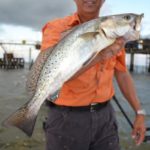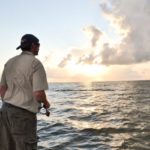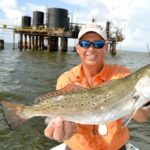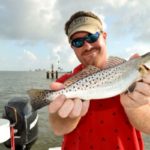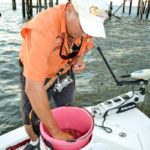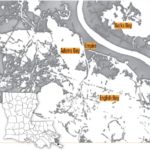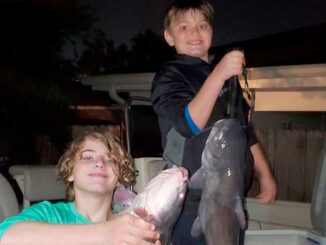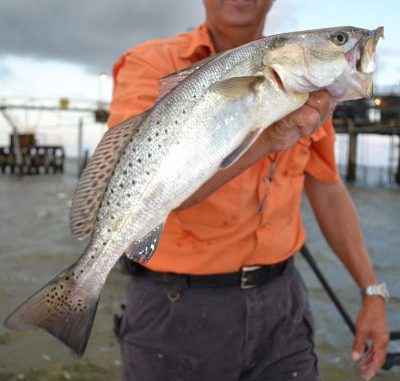
Do you have trouble catching fish on a west wind? Then you’ve obviously never been to Empire.
It doesn’t take a rocket scientist to figure out how myths began centuries ago when the human race was as sophisticated as the average corn cob.
For instance, we all know that stuff has a tendency to fall down, so the entire earth must be subject to the same laws of physics. Therefore, there obviously must be a giant god named Atlas who holds up the earth on his back.
Sucks to be that guy.
Or consider this: You have a bunch of guys — merchant mariners, pirates, whatever — who spend months and months at sea without the warmth or tenderness of a woman. Two weeks into the trip, they all start seeing fish with the bodies of topless, beautiful women connected to them.
They go home and tell their buddies at the pub about the irresistible mermaids at the center of the Atlantic, and the next day there’s a line at the docks looking to get on the next ship.
Surely, South Louisiana residents had myths of their own, and one of them HAD to be the Wicked Witch of the West. In the days before Google Earth, she lived just beyond the horizon where she reeled in the sun and pumped her massive bellows to push an ill wind across the coast.
The water drained from the marsh, the bays got dirtier than a Jenna Jamison movie and the coonasses ate fish stew without the main ingredient.
Miserable hag.
At the end of last May, the Wicked Witch of the West was alive and well. She turned phenomenal trout action on the west side of the Mississippi River during the first half of the month into nothing but a bumpy boat ride, salt spray in the face and, at the end of the day, a dinner of fried 35-cent shrimp.
Capt. Jody Donewar hates the Wicked Witch of the West as much as the next angler, but he doesn’t shake his fist in her direction or call to cancel his charters.
That’s because Donewar fishes out of Empire, one of the only ports in Southeast Louisiana uniquely situated to provide easy access to both the east and west sides of the Mississippi River.
For Donewar, deciding which direction to head in the morning is about as difficult as choosing between a puppy and a rattlesnake as a pet for your 8-year-old.
If the wind’s blowing out of the east, he heads west; if it’s blowing out of the west, he heads east.
End of lesson, class. Any questions?
Donewar was faced with the latter situation during a late-May trip last year. He hoped against hope the previous evening that the Wicked Witch would take the night off, but she was still huffing a steady 12 to 15 knots when Donewar arrived at Delta Marina at 4 o’clock in the morning.
“We’ll still catch fish,” he said, “but it’s so much easier when the winds are light.”
It’s also easier when you’re the first boat at the honeyhole, and that spot this time of year is Little Battledore, a sizable oil and gas structure that, for whatever reason, seems to hold more speckled trout than many of its neighbors.
“(Anglers) have been running from Venice, Delacroix, Hopedale — all over — to fish this rig,” Donewar said. “We’ve got to beat them there.”
So Donewar entered the Empire Lock at 5 a.m., before many anglers had even left home to head for the marina. After negotiating the lock, he headed south down the low-and-falling Mississippi River, and cut through the gap south of Ostrica.
From there, he pointed the bow straight to Little Battledore. Even with the lock, it wouldn’t be a 30-minute run.
“We’ve been catching a lot of really nice trout, averaging 2 to 4 pounds, on a daily basis,” Donewar said on the way out. “It’s just been great.”
Some of that activity had been on the west side of the river. Donewar, like most guides, had been participating in last season’s strong trout run in the Four Bayous area, which is only 17 miles from Delta Marina.
But that’s when winds are light or out of the east. When they’re out of the west, most days Donewar will head first to Little Battledore.
“It’s got lots of structure and big fish, and it’s the right depth to hold big fish,” he said. “It used to be a little deeper; it’s about 7 feet now.”
The rig usually looks like its the mothership for a bay-boat festival, but on this day, there wasn’t a soul on it when Donewar pulled up.
“I think everybody was scared off by the wind,” he said.
He eased to within casting distance of one of his favorite spots, the now defunct flare.
The flare operated constantly before Hurricane Katrina destroyed it, according to Delta Marina Manager Jonathan Mathes. Back then, it was a no-brainer nighttime hotspot in the summertime.
“There’s just something about the color of light those flares put off,” he said. “Fish love them.”
Now it’s just a rusted pipe that shouldn’t be any more attractive to trout than the rest of the rig. But it is.
After a number of casts came back fishless, Donewar made a slight adjustment with the anchor, and almost immediately, the fish responded. From there, the action was steady until a nearby storm squelched the bite.
By the time the storm passed, the tide had quit rising, and Donewar bounced around to some of the satellite rigs — more to kill time than anything — waiting for the tide to start falling.
When he could wait no longer, he went back to the flare to find the tide trickling out. Almost instantly, he hooked a fish.
“You’ve got to be patient,” he said. “There’s no sense in running all around trying a lot of spots because if the tide is not moving, they’re not going to be feeding anywhere.
“We know for a fact that right where we’re sitting there’s thousands of trout around this rig, so we’re going to sit here and be patient because we’ve been catching them here daily for weeks by the hundreds.”
He wasn’t getting any arguments from Mathes.
“I’ve got the option to fish any of these fields I want, and I’d call Battledore home,” he said. “These close-in rigs are full of those 12- to 18-inch trout, so if you can get out here, spend some time to get to know these rigs.
“Most of them have shell bottoms, so they’re their own little reefs and ecosystems.”
Staying was the right call. Donewar, Mathes and Burney Young put a bunch of fish in the boat before heading back to the marina for trout po-boys made by Young, who is a five-star chef and works at Delta.
They could have possibly caught larger trout farther out, but it’s hard to pass up a sure thing.
“Trout up to 5 pounds are not uncommon at Battledore,” Mathes said, “but the farther you go, you get out to Breton and Gosier, and all those rigs out there, and you’ve got a shot at those 7-pound trout.
“It’s all a matter of how much gas you want to burn and how big a bait you want to use. A good rule of thumb right now is the farther you go and the bigger the bait, the bigger the fish.”
But Mathes said the smoking-hot action on slightly smaller trout at Battledore won’t cool off for a while.
“It always seems to me that the fishing at the rigs stays good through October, even into November, but you don’t have to go so far, so people get lazy and lethargic and they’re tired of making those long runs,” he said. “What I always look for to make that shift to the inside is that first little tropical storm. When you get that high tide that comes in, those fish just seem to follow it and stack up on those inside points.
“We’ve got Quarantine Bay here on the east side. California Point’s kind of a landmark out here, and come fall you don’t really have to go past California Point.
“You’ve got Sable Island, Bay La Mer, Bay Allen — you’ve got everything you need over here.”
Both Mathes and Donewar agree that live bait is a must-have this time of year.
“If you go with live shrimp, it’s almost a guarantee that you’re going to bend the pole,” Mathes said. “I’m a live-bait super freak. You’ll never see me on the boat with less than 100 shrimp per guy.”
Donewar is such a strong believer in live shrimp that he’s converted both pedestal seats on his Ranger bay boat to bait stations.
Anglers should find Little Battledore and the rest of the rigs in the field productive throughout the summer season, particularly if the river follows suit to last year, when it began falling in April and was at autumn levels in May.
A high river isn’t devastating, but a low river means really good things for the area, according to Donewar.
“A low river to us is a big, big thing,” he said. “It’s a big factor in what we’re going to catch, how many we’re going to catch and where we need to be.”
And right now, there’s no place Donewar needs to be other than Little Battledore.
Go ahead, Wicked Witch. Blow all you want.
For more information, call Donewar at 504-453-1519 or visit www.captainjodydonewar.com. For more information on Delta Marina, visit www.thedeltamarina.com.
